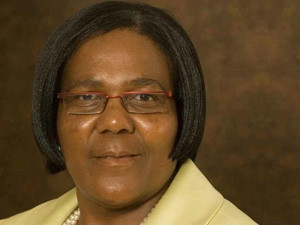
Trade union Solidarity has reacted to transport minister Dipuo Peters' comments that the average fuel levy will have to be increased to R3.65 per litre to cover the cost of Gauteng's toll roads, accusing the minister of employing "scare tactics".
A special levy of only 12c per litre would be sufficient to pay off debt incurred for the roads, with interest, within 10 years, says the union.
Earlier this week, Peters appeared before the e-toll review panel, as part of a government delegation consisting of officials from the Department of Transport, National Treasury and the South African National Roads Agency (Sanral). Addressing the panel, Peters, followed by acting transport DG Mawethu Vilana, rejected the much-vaunted idea of funding e-tolls through the fuel levy, and instead defended the current user-pay principle.
Vilana argued that to merely address the road network sustaining maintenance needs of R65.8 billion per annum would require an additional levy of R1 per litre of fuel - meaning an average fuel levy of R3.17 per litre.
He also stated to address the remainder of the strengthening and re-gravelling not covered as part of the "sustain allocation" above, and gravel road surfacing backlog, will require a further R0.48 per litre of fuel - meaning an average fuel levy of R3.65 per litre.
Solidarity this morning noted the average fuel levy is currently R2.17 per litre, meaning an increase of R1.48 is needed to arrive at the minister's R3.65. "An additional levy of R1.48 per litre will be able to cover the cost of Gauteng's toll roads within less than a year, while infrastructure is typically paid off over a much longer period," says the union.
More than enough
Paul Joubert, senior economic researcher at the Solidarity Research Institute, says the tax statistics which were recently released by the South African Revenue Service show that, at the moment, tax is levied on approximately 22 billion litres of fuel annually.
"This means that an additional levy of R1.48 per litre of fuel will bring in at least R32 billion in additional tax income annually. Since the minister has estimated the cost of the overall backlog in road maintenance work in South Africa to be R197 billion, such a levy would not only cover the cost of Gauteng's roads, but also settle the entire country's backlog within just six years in cash.
"It is doubtful that sufficient construction capacity even exists in South Africa to finish the work faster than the money will be collected through such a levy," says Joubert.
Although exact figures for the cost of the upgrades to Gauteng's highways are unknown, he adds, amounts in the region of R20 billion have often been mentioned. Joubert points out that - including the interest to be paid on this debt - an estimated levy of only 12c per litre would thus be needed to pay off the R20 billion within 10 years.
"By claiming that a drastic increase in the fuel levy will be needed as an alternative for the e-tolling system, the minister is merely employing scare tactics, unless there are figures the minister is withholding from the public," he says.
Gross exaggeration
The Opposition to Urban Tolling Alliance (Outa) says it is "shocked at the gross exaggeration and disingenuous nature" of Peters' statement that a further R3.65 would need to be added to the fuel levy to fund the Gauteng Freeway Improvement Project (GFIP).
"If one takes a little time to assess the impact of an extra R3.65 on the fuel levy and compares this to the road infrastructure requirements, one quickly realises the absurdity of this statement and the claims made by the minister," says Outa.
The organisation notes by adding the suggested R3.65c per litre to the fuel levy, an additional R84 billion would be generated into the tax pot a year. "This means the suggested R3.65 per litre will be able to finance almost five new GFIPs.
"Clearly the minister and Sanral, when quoting this figure of R3.65 per litre, are conflating all other road upgrades and backlog projects throughout the country. If so, Outa regards this as disingenuous to conflate the entire nation's road backlog costs in a discussion which is purely centred around the e-toll matter."
Outa chairperson Wayne Duvenage notes it is this kind of misinformation and gross exaggeration that leads to further mistrust in government.
"Statement like these are intimidatory and we sincerely believe the minister's office is being misled by whoever is advising her on these figures. This also raises concerns that the minister might not be taking the necessary time or seeking expertise to challenge Sanral on their claims and calculations. Quite frankly, this is becoming an embarrassing situation for the minister and the country."
Department of Transport spokesperson Tiyani Rikhotso could not be reached for comment on the quoted fuel levy figures this morning.
Share